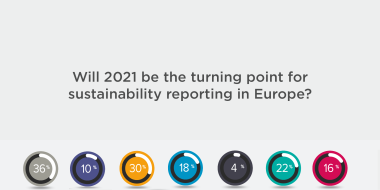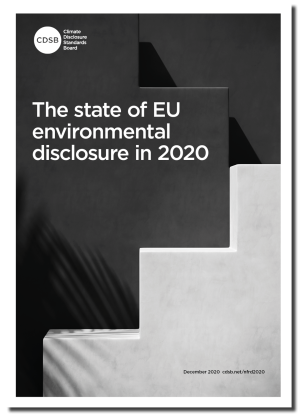CDSB's Policy Manager, Axelle Blanchard, shares her views on the current state of reporting policies and corporate practices following the launch of CDSB’s latest analysis of 2020 environmental disclosure by Europe’s major companies in order to assess what is ahead of us in 2021.

The state of play at the end of 2020: triggering climate ambition to foster green recoveries
2020 will certainly remain a memorable year in world history with the rise of the COVID-19 pandemic. European policymaking has been heavily disrupted both in its traditional way of working, with the need to move to virtual events and meetings, but also more importantly, in its purpose and ultimate objectives.
Climate and environmental policies are no exception to this disruption.
Thankfully, while some voices have been calling for delaying initiatives as a result of the pandemic, a range of stakeholders, from public authorities to businesses, have spoken out in favour of acting stronger and faster to tackle the climate and environmental crisis. As a result, we have seen the European Member States endorse a target for the European Union to reduce greenhouse gas emissions by at least 55% by 2030 below 1990 levels. At the same time, whilst celebrating the five-year anniversary of the Paris agreement, French public authorities and supervisors have supported the adoption of the Task Force on Climate-related Financial Disclosures (TCFD) recommendations by large companies listed on the CAC40.
These examples show that there is hope for a green economic recovery as well as further policies around transparency on risks and impacts of environmental issues on businesses. We can also expect concreate actions from businesses themselves to embrace these challenges through more responsible business conducts and investment strategies. These further actions will need to address the lack of proper implementations of the TCFD recommendations among European companies, including (but not limited to) turning these recommendations into binding legislative requirements.
CDSB's work in 2020: contributing to the development of evidence-based ambitious climate and environmental policies

The direction of travel in 2021: actions and initiatives to expect from the European Commission
At the launch event of the study on December 7th, European Commissioner Mairead McGuinness provided in her keynote address a set of very powerful messages showcasing the undeniable commitment of the European Commission on sustainable finance and corporate reporting under the umbrella of the European Green Deal. Commissioner McGuinness described it as the “green and sustainability growth strategy” guiding the future of Europe but also as a roadmap to reach global and European climate policy objectives.
"The rules of the game must be transformed to fully integrate sustainability at every step of the financial value chain..." @McGuinnessEU highlights the priorities of the #EUGreenDeal. pic.twitter.com/NhIKTbUEJ6
— CDSB (@CDSBglobal) December 7, 2020
Reiterating that COVID-19 could not be taken as “an excuse to delay addressing the challenges related of climate change, environmental degradation and biodiversity loss” the Commissioner recalled that half a trillion euros per year of additional investments in the EU is needed to meet the ambitions of the Climate Law and carbon neutrality by 2050. She also mentioned that the EU has already decided to allocate 37% of its recovery package to finance the Green Deal objectives. Beyond the need for public money to be aligned with ambitious climate and environmental objectives, the financial sector has a key role to play. The European Commission will therefore put forward in 2021 a renewed sustainable finance strategy to ensure that sustainability is integrated at into every step of the financial value chain.
CDSB and Alliance for Corporate Transparency latest findings on the state of environmental disclosures
At CDSB, we share the Commissioner’s view that non-financial reporting is a powerful tool to “strengthen the foundations of sustainable investments.” Mardi McBrien, CDSB’s Managing Director, explained at the event how CDSB’s work contributes to providing evidence on the importance to improve corporate reporting in Europe, including by reading annual reports from a set of 50 European businesses “from cover to cover” in order to assess the uptake of the NFRD requirements and the TCFD recommendations, one year after the publication of the European Commission’s guidelines on climate-related reporting. As in our past two similar studies, the overall picture from the report is still mixed with remaining challenges when it comes to reporting on principal risks, materiality definition and implementing the forward-looking disclosures of the TCFD Recommendations. The picture could even be worse when looking beyond these 50 large companies we assessed, among all those included in the scope of the NFRD or when looking at issues beyond climate such as water, biodiversity of forest-related disclosures.
Such results are also aligned with the findings from the Alliance for Corporate Transparency who have looked at environmental disclosures by a larger set of 300 companies from Eastern and Southern Europe. The research highlights the need for companies to improve their disclosures on KPIs, governance and business model as well as policies, outcomes and risks with of course different results within the different jurisdictions considered in the study.
2021: a defining year for further harmonisation of non-financial reporting standards?
The event was concluded by Patrick de Cambourg, chair of the EFRAG Project Task Force (PTF) working on EU non-financial reporting standards. He recalled the audience that alongside the NFRD review, EFRAG was mandated by the European Commission to reflect on the need for European Non-Financial Reporting Standards, as it believes that moving towards consistent standards of non-financial reporting could help increase the quality of corporate disclosures. Patrick de Cambourg presented the main conclusions of the recently published interim report on the work performed by the PTF, which includes six conclusions on:
- The EU’s “impetus towards change” and the need to reform and improve the NFRD;
- The consideration of inputs from other non-financial reporting initiatives and standards;
- The existing differences in conceptual frameworks and the will from the EU to include its own features in the standard setting process, including the double materiality approach ;
- The need to interconnect financial and sustainability reporting ;
- The specific challenges financial market participants meet as preparers and users of financial information; and
- The questions around location and format of the information to be easily accessible, including though progress on digitalisation.
Based on these conclusions, the PTF will move to a second phase of its work and provide policy recommendations to the European Commission by the end of January 2021, in order to reach what Patrick de Cambourg called a “win-win situation to foster progress” and including a consultation of all relevant parties.
"There is an EU momentum in the space of sustainable corporate governance" - Patrick de Cambourg, Chair, @EFRAG_Org Project Task Force on Preparatory Work for the Elaboration of possible EU Non-financial Reporting Standards, President of the Autorité des normes comptables (ANC) pic.twitter.com/YXBkdKhcX1 — CDSB (@CDSBglobal) December 7, 2020
Hopes and dreams for 2021
On December 12, the Paris agreement celebrated a five-year anniversary. More ambitious policy initiatives are expected from the EU under the Biodiversity Strategy, the Climate Adaptation Strategy or the renewed sustainable finance strategy, while negotiations on the details of the EU Climate Law, a first of its kind, are still on the way.
2021 will also see major developments at the international level with both the COP26 and the 15th Conference of the Parties (COP15) of the Convention on Biological Diversity (CBD). 2021 might therefore be a year of significant change to scale up actions on both climate but also on biodiversity, including on the accounting side to be able to “measure the nature we treasure”, as stated by Dr Zakhri, chair of the Intergovernmental Science-Policy Platform on Biodiversity and Ecosystem Services (IPBES).
At CDSB, we see corporate reporting as a key piece of the puzzle to reach global and European climate and environmental objectives. As collaboration is part of our DNA, we will keep engaging with all interested parties in the years to come to boost the quality of corporate disclosures and foster innovation in the EU and at global level.
Further resources:
- The video recording of the launch event and slides
- Summary of recommendations for policymakers
- Joint position of the Alliance for Corporate Transparency on the reform of the EU NFR Directive
- 2019 disclosure review "Falling short?"
- 2018 disclosure review "First steps"
- EU environmental reporting handbook
- Enhanced Reporting Europe campaign

With the contribution of the LIFE Programme of the European Union
The content of this page is the sole responsibility of the author and can under no circumstances be regarded as reflecting the position of the European Union